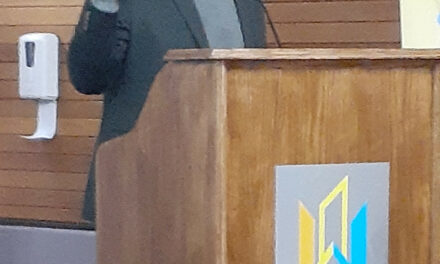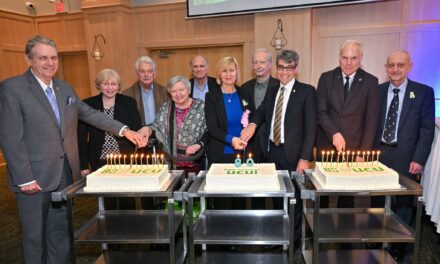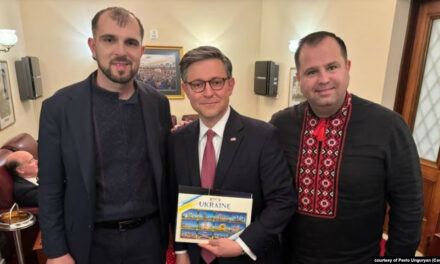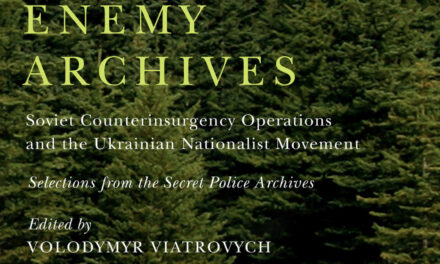Yuri Bilinsky, Mykola Swarnyk, NP-UN.
The Metropolitan Andrey Sheptytsky Institute of Eastern Christian Studies has recently presented another exquisite spiritual and intellectual event for the general public. Fr. Brian Kolodiejchuk, CM, the renowned author and editor of several books on Mother Teresa of Calcutta, provided a unique and intimate insight into the personality of one of the greatest contemporary figures who is now a Catholic saint. Fr. Brian worked closely with Mother Teresa for decades and was the postulator for the cause of her canonization as a saint.
Fr. Kolodiejchuk was ordained for the Missionaries of Charity (MC) in the early 1980s in his native Ukrainian-Byzantine Rite (with Mother Teresa present), and has served in the Roman Rite for decades because of his work in Mother Teresa’s communities throughout the world. Her communities now exist in Ukraine as well.
Fr. Brian shared his experiences with Mother Teresa at Windle House (5 Elmsley Place) at the heart of the University of St. Michael's College campus. In his talk, he presented several moving and inspiring treats of St. Teresa’s extraordinary personality that the laity is generally not aware of. He stopped in more detail at St. Teresa’s three virtues, faith, humility, and charity, the last one under the form of compassion.
Talking about her faith, Fr. Brian noted that Mother Teresa had a wonderful combination of being very human and very supernatural. She wasn't very good at telling jokes, he said, but she had a good sense of humor. She liked chocolates and ice cream and had the custom to bring chocolates whenever she was visiting a house. And she would tell a joke about the chocolates that her father would bring home from his travels. These chocolates, in those times of need, would be gifted several times and make a full circle in a couple of years.
Mother Teresa lived her daily life, viewed all things, and made all decisions according to faith. Many people found that overwhelming: her well-known critic, Christopher Hitchens, had a certain sense of admiration for Mother Teresa and said that her unshakeable faith would impress even the secular.
Mother Teresa's vocation to charity began on September 10th, 1946, on the train trip from Calcutta to Darjeeling. While on the train, she received the call to leave Loreto Sisters, which she loved, and not because she was looking for a way to leave, she was already serving the poor at the Loreto congregation, but the call was to start serving the poorest of the poor.
This conviction that her mission among the poor was God's work, which also reveals her deep humility, carried her over the many challenges. She started the work literally from zero and by the time she died her mission counted about 4,000 sisters in 133 countries.
Mother Teresa’s conviction was that what she was doing was God's work. She once wrote to the Archbishop Perrier of Calcutta: “[the] work has grown because it is He, not I that does it through me. Of this, I'm so convinced that I would give my life gladly to prove it.”
She would also say, ‘I am just a pencil in God's hand.’ That was one of her favorite images, so the beauty and the power reflected by the marks the pencil left behind were not her own, they were the Writer’s, God's. To be simply a pencil is not very much, noted Fr. Brian, yet in referring to herself as a pencil, she never failed to stress ‘in God's hands.’ And that makes the difference, he said, – she had this very deep belief that she was just a useless instrument unless held in God's hands.
She felt dependent on God, directed by Him, willing to be used by Him, without being consulted. This being totally available to God will make up for whatever weaknesses and limitations we have, said Fr. Brian, because God will use us way beyond just our natural limitations. Mother Teresa was a great example of that.
In 1942, Mother Teresa made a private vow, to not refuse God anything He would ask. And she would try really hard to discern what God wanted from her. She made decisions thorough contemplations, and after that, she felt that God would take care of things. “She had an unbelievable trust that God would just take care of things,” said Fr. Brian.
Speaking of Mother Teresa’s humility, Fr. Brian recalled her saying, “Let the sisters and the people eat you up.” She strived to be available and do as much as she could. Fr. Brian provided a memory from her biography by Eileen Keegan, that Mother Teresa would seemingly act as if she had no personal needs. He also offered his personal memory about Mother Teresa changing her plans and coming from Rome to New York to visit Fr. Brian’s sister who was treated for cancer at a clinic. Right from the airport, she went to the doctor's office and told the doctor, who was Catholic, “I have a gift for you to make my sister well.” That's why everyone called her mother, she very maternal, said Fr. Brian.
Being a global celebrity, Mother Teresa was very simple. She would offer and serve food in different situations, in a motherly way. Fr. Brian remembered his thinking when meeting her at the Missionaries of Charity regional house in New York: “Now here I am, in this place. And you know, some people just would love to have a chance to see her and touch her. And here she is serving us tea and coffee and biscuits.”
Following the example of the Mother of God, Mother Teresa did not let pride enter her personality. It would have been very easy for her to be a little proud, said Fr. Brian.
She once told her congregation, “God gave me the grace that what I hear, all the praise goes in one ear and out the other. By the time I reached my room, I have forgotten what people have said in the parlor.”
She stressed though that humility is not saying that one is not good for anything, it is realizing that without Christ one can't do anything. But with Christ, one can do great things.
Mother Teresa was very calm, peaceful, and serene, so she could accept either praise or blame. She said, “If you are humble, nothing will touch you. For this, sisters, we need to continually seek the union with God in prayer.”

Missionaries of Charity Father Brian Kolodiejchuk with St. Teresa and St. John Paul II
Mother Teresa’s only love was Jesus, especially under the form of the Sacred Heart. She was baptized in the Sacred Heart of Jesus Roman Catholic Church in Skopje, now North Macedonia. Her passion for Jesus was in both senses of the word: as in passionately in love with someone, and as in suffering. Fr. Brian said that the experience she was having could be explained by the words of the medieval mystic Johannes Tauler, who vividly described the suffering of the person who's going through such a trial: “Then we are abandoned in such a way that we no longer have any awareness of God, and we fall into such anguish that we no longer know if we were ever on the right path, nor know if God even exists or if we ourselves are alive or dead. And so anguish besets us that is so strange and seems as if everything in the entire world was joined together to afflict us.”
Starting September 10th, 1946, she was receiving locutions: hearing the voice of Jesus very distinctly. Her letters say that in all her Holy Communions, Jesus continually asked, ‘Will thou refuse,’ meaning, to leave and start the work with the poorest. Four years earlier, she made the vow not to refuse Jesus anything, and He would ask her, ‘Now Teresa, remember you made that vow not to refuse Me?’
Mother Teresa experienced what she called ‘the darkness’ and ‘the tunnel’ starting in 1937 when she was making her final vows. With a short period of real consolation, even an ecstasy and great union with God, most of the time after she established the Missionaries of Charity, she experienced the darkness, a terrible sense of loss, great loneliness, the torment of thinking she is not wanted by God. She wrote to the priest who anointed her: “Pray for me, for the life within me is harder to live, to be in love, and yet not to love, to live by faith, and yet not to believe, to spend myself, and yet be in total darkness. Pray for me.”
As Richard N. Ostling explained in the article in Washington Post, the divine silence was especially excruciating for Mother Teresa because she enjoyed vivid experiences of God's love and immediate presence in 1946 when she was called to enter the slums and leave behind the comforts and joys of teaching at a convent school. The phenomenon of darkness – feeling keenly aware of God's silence or absence – has been experienced by saints and mystics through the ages.
In one version, God's light is so blazingly absolute that his glory is veiled in a dark “cloud of unknowing.” Christianity also teaches that Jesus endured Crucifixion for the sins of all people and that he cried from the cross about God's abandonment.
In the same article in WP, Fr. Brian explained that, for Mother Teresa, who loved God above everything else, the loss of the divine presence was the ultimate sacrifice that emptied her soul. Perhaps, he suggested, “Mother Teresa will become the patron saint of the lonely and those feeling unwanted and unloved.” At the same time, Kolodiejchuk said in the article, for Mother Teresa who loved God above everything else, the loss of the divine presence mysteriously energized her mission.
Share on Social Media




































